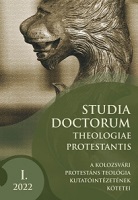Jövevények és idegenek. Eszkatológiai identitás és öntudat Péter első levelében
Aliens and Exiles. Eschatological Identity and Consciousness in The First Epistle of Peter
Author(s): Éva ÉlesSubject(s): Christian Theology and Religion, Metaphysics, Theology and Religion, Philosophy of Religion, Sociology of Religion
Published by: Kolozsvári Protestáns Teológiai Intézet
Keywords: aliens and exiles; eschatological identity; imitatio Christi; the First Epistle of Peter;
Summary/Abstract: The Christian view of man is often intertwined with the philosophical idea of homo viator (pilgrim man). Gabriel Marcel, the father of Christian existentialism, attempts to weave together the relevant strands of religion and philosophy in his book Homo viator: Introduction to the Metaphysics of Hope. We often interpret the lifespan of a few decades on Earth as a journey, a wander. This observation has led to a number of questions: from where did we come from and where will we arrive? If we are passing travellers, how should we relate appropriately to the world and to those who are travelling with us in the same time and space? And in what sense does Peter’s first letter call his addressees “aliens” and “exiles” (1 Peter 1:1; 2:11)? This presentation will highlight the context of Peter’s first letter in which the author provides an eschatological grounding for Christian identity. Yet, this identity, in turn, can be understood not only in the theological tradition of the people of Israel, but also in the new existence in which we can participate through baptism. The cornerstone of this identity is found in 1 Peter 2:2: “Like newborn infants, long for the pure spiritual milk, that by it you may grow up into salvation”(ESV). As we shall see, the petrine context intersects with, and at some point surpasses, the issues raised by the philosophical aspects of homo viator.
Journal: Studia Doctorum Theologiae Protestantis
- Issue Year: 13/2022
- Issue No: 1
- Page Range: 7-24
- Page Count: 18
- Language: Hungarian

